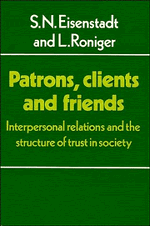Book contents
- Frontmatter
- Contents
- Preface
- 1 PERSONAL RELATIONS, TRUST AND AMBIVALENCE IN RELATION TO THE INSTITUTIONAL ORDER
- 2 THE CONSTRUCTION OF TRUST IN THE SOCIAL ORDER AND ITS AMBIVALENCES: VIEWED FROM THE DEVELOPMENT OF SOCIOLOGICAL THEORY
- 3 THE STRUCTURING OF TRUST IN SOCIETY: UNCONDITIONALITIES, GENERALISED EXCHANGE AND THE DEVELOPMENT OF INTERPERSONAL RELATIONS
- 4 THE BASIC CHARACTERISTICS AND VARIETY OF PATRON–CLIENT RELATIONS
- 5 THE CLIENTELISTIC MODE OF GENERALISED EXCHANGE AND PATRON–CLIENT RELATIONS AS ADDENDA TO THE CENTRAL INSTITUTIONAL NEXUS
- 6 THE SOCIAL CONDITIONS GENERATING PATRON–CLIENT RELATIONS
- 7 VARIATIONS IN PATRON–CLIENT RELATIONS
- 8 RITUALISED INTERPERSONAL RELATIONS; PRIVACY AND FRIENDSHIP
- 9 CONCLUDING REMARKS: THE DIALECTICS OF TRUST AND THE SOCIAL ORDER
- Notes
- Index
2 - THE CONSTRUCTION OF TRUST IN THE SOCIAL ORDER AND ITS AMBIVALENCES: VIEWED FROM THE DEVELOPMENT OF SOCIOLOGICAL THEORY
Published online by Cambridge University Press: 01 June 2011
- Frontmatter
- Contents
- Preface
- 1 PERSONAL RELATIONS, TRUST AND AMBIVALENCE IN RELATION TO THE INSTITUTIONAL ORDER
- 2 THE CONSTRUCTION OF TRUST IN THE SOCIAL ORDER AND ITS AMBIVALENCES: VIEWED FROM THE DEVELOPMENT OF SOCIOLOGICAL THEORY
- 3 THE STRUCTURING OF TRUST IN SOCIETY: UNCONDITIONALITIES, GENERALISED EXCHANGE AND THE DEVELOPMENT OF INTERPERSONAL RELATIONS
- 4 THE BASIC CHARACTERISTICS AND VARIETY OF PATRON–CLIENT RELATIONS
- 5 THE CLIENTELISTIC MODE OF GENERALISED EXCHANGE AND PATRON–CLIENT RELATIONS AS ADDENDA TO THE CENTRAL INSTITUTIONAL NEXUS
- 6 THE SOCIAL CONDITIONS GENERATING PATRON–CLIENT RELATIONS
- 7 VARIATIONS IN PATRON–CLIENT RELATIONS
- 8 RITUALISED INTERPERSONAL RELATIONS; PRIVACY AND FRIENDSHIP
- 9 CONCLUDING REMARKS: THE DIALECTICS OF TRUST AND THE SOCIAL ORDER
- Notes
- Index
Summary
The preceding discussion indicates that a clue to the understanding of the links between the interpersonal relations studied here and the institutional matrix within which they develop can be found in the analysis of the place of trust and meaning in society, as well as in the connections of social relations with some higher, ultimate meaning in the construction of social order.
This has indeed been among the basic problems of classical as well as of contemporary sociological theory, but it was not connected – with the partial exception of the analyses of primary groups that developed from the 1940s onwards – with the study of interpersonal relations. It was only from the mid-sixties, as we have indicated above, that the study of such relationships – especially patron–client links – was connected with central problems of sociological theory, and with those controversies which developed around the functional school in anthropology and the structural–functional school in sociology.
The institutional significance of interpersonal relations is better understood within the context of these developments in sociological theory. Accordingly, in the following sections, we shall review briefly the way in which the place of trust in the construction of social order was analysed in classical sociological theory and in the functional school in sociology. We shall then proceed to analyse some of the major controversies in sociological theory which have developed since about the sixties and which have focused particularly on the criticism of these schools and the connection of the study of interpersonal relations in general, and of patron–client relations in particular, to these controversies.
- Type
- Chapter
- Information
- Patrons, Clients and FriendsInterpersonal Relations and the Structure of Trust in Society, pp. 19 - 28Publisher: Cambridge University PressPrint publication year: 1984
- 1
- Cited by



